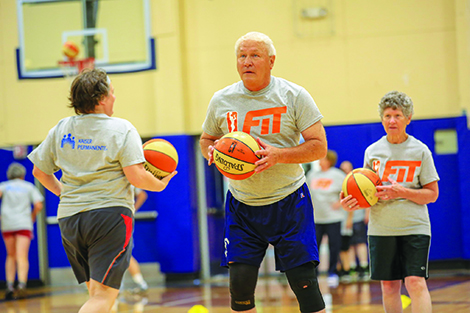Are you an older adult looking for some inspiration to stay physically active? The 2019 National Senior Games, presented by Humana, gathered a record number of more than 13,700 athletes aged 50 and over to compete in 20 medal sports in Albuquerque, N.M. And the annual Washington State Senior Games drew about 2,000 competitors for events staged in Thurston and Pierce Counties July 26-28.
Many assume competitors are elite or career athletes. While that’s true for some, others find the opportunity in midlife to learn a new sport or return to an athletic passion of youth that lapsed with the demands and distractions of adulthood. Others discover that organized senior sports provide a motivation to exercise regularly with goals reaching beyond the tedium of the treadmill.
The National Senior Games Association (NSGA) is comprised of 54 member games held annually throughout the U.S. and Canada. Athletes qualify for the nationals in even-numbered years within age divisions.
“While people are competing for medals, they are also pursuing their optimum health, which we say is your real personal best,†says Marc T. Riker, chief executive officer of NSGA. “It’s a lifelong journey that can begin for anyone, at any skill level, at any age.â€
The health benefits of athletic competition are striking. On average, athletes measured a fitness age 25 years younger than their chronological age in an NSGA study.
Another potential benefit of sports participation is accident prevention. Falls are the leading cause of fatal injury and the most common cause of non-fatal trauma-related hospital admissions among older adults, according to the U.S. Centers for Disease Control and Prevention. However, results from Senior Athlete Fitness Exam (SAFE) screenings reveal that only 10 percent of senior athletes have a fall in a given year, which is one-third the rate of the general population.
Of course, older adults don’t need to play sports to achieve and maintain a better quality of life. Regular exercise and other recreational activity provide tangible health benefits, as well. But competitive sports, such as the Senior Games, engages participants mentally and socially and provides goals and motivation to stay active.
“The Senior Games is about more than competition. It provides fitness, fun and fellowship,†said Riker.
Founded in 1987, the National Senior Games is the largest Olympic-style multi-sport event in the world for older adults. It’s held in host cities every two years, with Fort Lauderdale, Fla. set to host in 2021. More information is available at nsga.com.
Source: StatePoint
